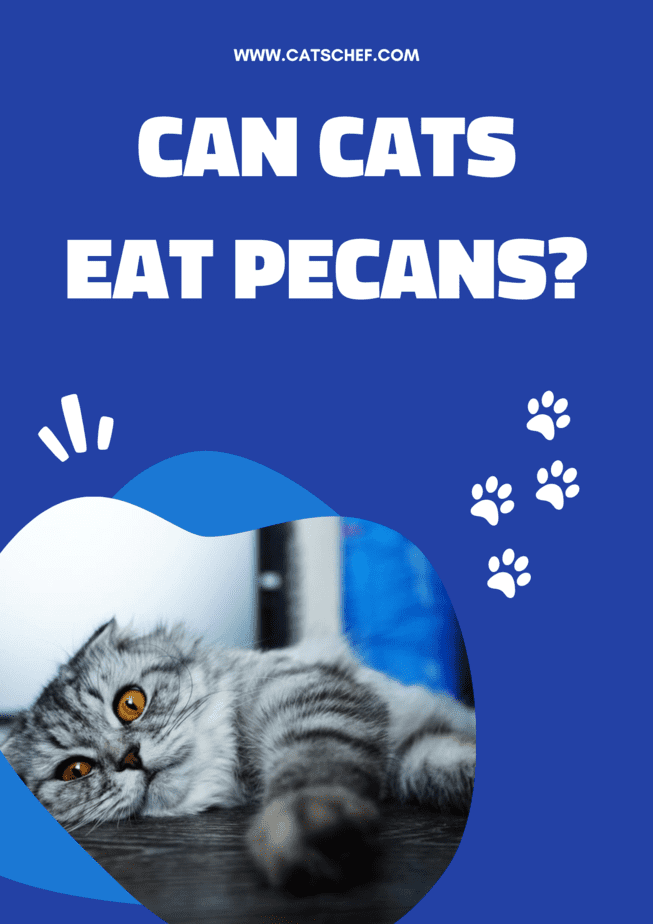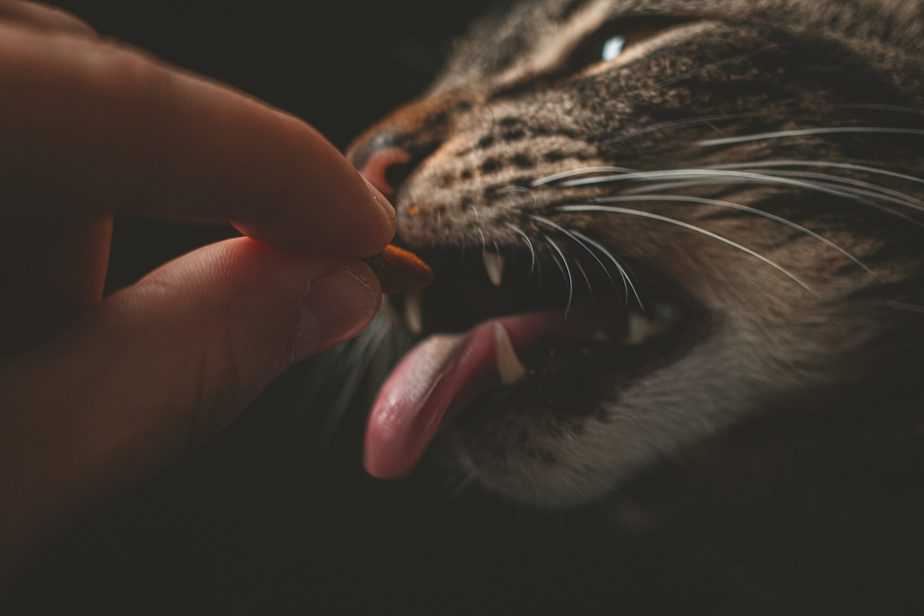Pecan pie is one of those all-time-favorite, holiday desserts everyone enjoys making for their family. The smell of sugar and butter takes over the entire house, and those delicious pecan nuts become the main talk around the table. Even your cat loves them. But wait a minute – can cats eat pecans?
Cats are such curious little monsters. They walk around the house as if they own it, running around with their fluffy tails up high searching for any fallen bits of food. It wouldn’t be the first time your furry monster snatched a couple of pecans before you could do anything about it!
You’re pretty sure she doesn’t have any allergies. I mean, she seemed to enjoy that nut roast you made for your vegan friends last week. Why would this be any different?
Can cats eat pecans?
‘What did the pecan say to the walnut? We’re friends because we’re both nuts!’ – with that joke out of the way, let’s talk about the relationship between cats and nuts.
Chances are you’ve probably seen ‘may contain traces of nuts’ on some cat food labels. Does that mean nuts are safe for your cat to consume, and do pecans even fall under that category?
Pecans are a type of nut produced by Hickory trees. They’re similar to walnuts as they’re surrounded by a hard shell that requires a stone to crack open. Unlike walnuts, they’re a bit longer and smoother in appearance once you take them out of their shell.
Now to answer the question you’ve been waiting for this entire time – yes, cats can eat pecans! These mouth-watering snacks aren’t toxic to cats. If your feline friend likes to nibble on pecans while you’re busy making the pie, you have nothing to worry about.
Cats aren’t likely to experience any health issues from eating this particular type of nut. However, that doesn’t mean you should feed your cat nuts as a regular part of her diet.
You have to keep in mind that some cats can be allergic to nuts, and too many nuts can cause an array of problems.
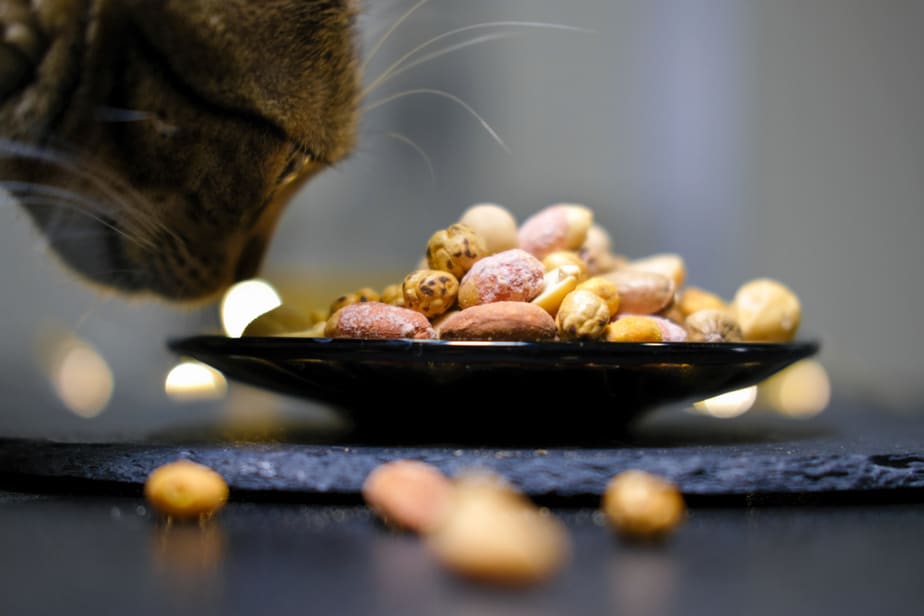
Are pecans good for cats?
Let’s start from the beginning. Pecans are one of those superfoods that people always recommend when you’re trying to eat healthy.
You can add them to your smoothie bowls, blend them to make the most delicious creamy sauces, and munch on them throughout the day. But, are they good for your cat?
Our furry friends have different digestive systems than us, and they require a distinct diet. You should always prioritize feeding your cat animal protein with some supplementary, vitamin-packed snacks.
But pecans could actually be a great source of additional vitamins and minerals for your feline friend.
These savory nuts are a great source of plant protein (A+ from your cat). They’re also rich in Omega-3 fatty acids, vitamins, and minerals. Keep reading to find out why these properties affect your furry friend in such a positive manner.
1. Pecans are rich in Omega-3 fatty acids
Pecans are very high in fat content and contain a significant amount of Omega-3 fatty acids. These provide your cat with much-needed assistance in battling any inflammatory diseases.
Not only that, munching on pecans every once in a while can help your cat prevent the start of some of those diseases such as arthritis, kidney disease, and heart disease.
Cats are skeptical when it comes to their food choices. It can be quite challenging to feed them their medication. That’s where pecans step in – they’re delicious, crunchy, and weird enough to keep your feline friend interested.
It goes without saying, these tasty treats can’t replace your cat’s medication. The best they can do is offer a helping hand in keeping your rebellious rascal happy and healthy. If your cat’s in need of some Omega-3 fatty acids and you don’t have any sardines under your sleeve, you can always opt for pecans!
2. Pecans are packed with vitamins and minerals
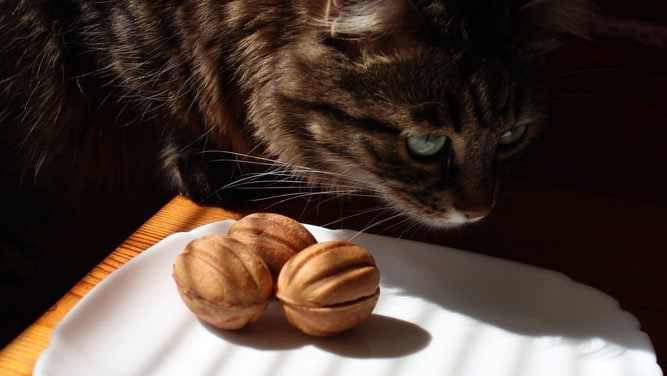
Just because cats are obligate carnivores doesn’t mean they don’t require anything else in their diets. Apart from animal protein, cats also need an array of vitamins, antioxidants, and minerals to function properly.
If your precious purr machine was in the wild, she would get her dose of vitamins by eating different plants and wild berries. Since she’s sleeping peacefully on your bed, you have to be the one to provide her with the necessary nutrients!
Pecans are a great source of vitamin A, vitamin E, folic acid, calcium, magnesium, phosphorus, potassium, several B vitamins, zinc, and fiber. Feeding your cat an occasional pecan snack will provide her with more than nineteen types of vitamins and minerals!
3. Pecans are great for your cat’s heart
These mouth-watering nuts contain plenty of unsaturated fats which are proven to have a protective effect on your furry friend’s heart. If your feed your cat a couple of pecans every once in a while, you’ll help keep her blood cholesterol levels in check.
Another interesting fact about pecans – they are 70% pecan oil! Pecan oil is also proven to reduce the risk of heart disease in cats.
Lastly, if you choose to feed your cat pecans because of these amazing nutritional benefits, make sure to consult with your vet. Too many pecans can have a negative impact on your cat’s health. You should also check if she is allergic before introducing any new foods to her diet.
Are pecans bad for cats?
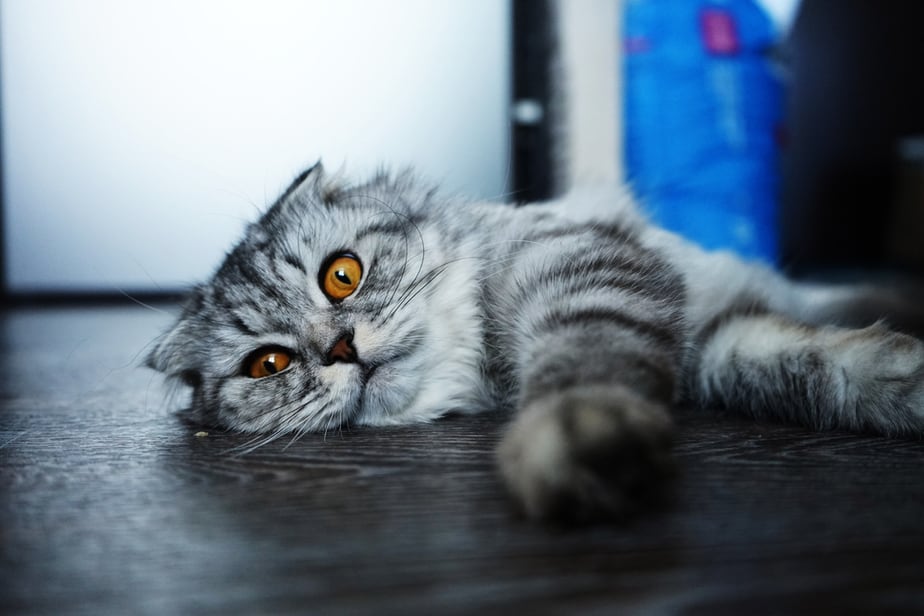
Can cats eat pecans safely? Are they bad for felines?
Pecans might not be toxic to cats, but that doesn’t mean they can eat them all the time with no repercussions. Nuts can be fatty and high in calories which makes them a bad choice for your cat’s everyday consumption.
You don’t have to worry if your furry friend takes a couple of bites when you’re not looking. Such a small amount of pecans won’t do any harm to your cat. But, if you’re planning on adding pecans to your daily grocery list you might want to take some of these risks into consideration.
1. Pecans are super fatty and caloric
Being rich in pecan oil and Omega-3 fatty acids makes pecans a healthy snack for your cat. But, if your fussy friend discovers the joy of nutty treats and starts begging for them daily, you’re going to be in trouble. Therefore, hide the bag if you have a chubby furball in your house!
Pecans are fatty and caloric. Feeding your already overweight cat pecans every day is probably the worst idea you can have. Not only that, pecans can be quite difficult for cats to digest, and one too many will cause stomach distress, diarrhea, and vomiting.
Cats can benefit from unsaturated fats, but a high-fat diet also leads to feline obesity and other weight-related diseases. Even if you decide to add a couple of pecans to your cat’s bowl, make sure she doesn’t eat too many!
2. Cats can be allergic to pecans
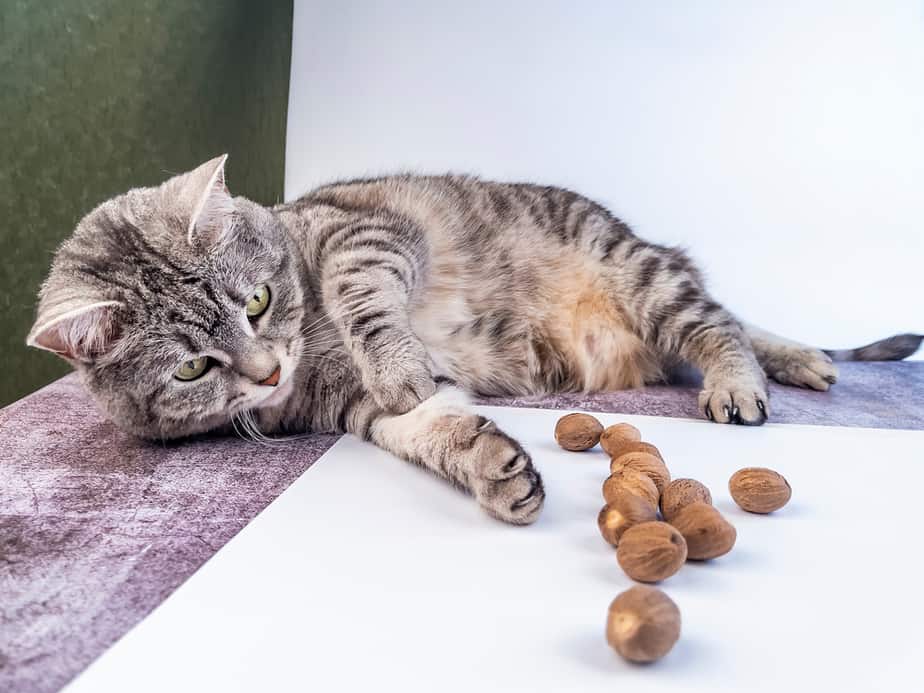
Nut allergies are extremely common among humans. Unfortunately, cats are no different. Before introducing new foods to your cat’s diet make sure to consult the vet about any potential allergy risks.
The best way to recognize an allergic reaction is to look for unusual symptoms and behaviors. If your cat is allergic to pecans, she will most likely show signs of discomfort, lethargy, itchiness, frequent sneezing, and potentially develop a rash.
In some extreme cases, your cat might experience stomach distress, vomiting, and diarrhea. If this happens, make sure to contact your vet immediately, or take her to the nearest emergency animal care. Follow their advice and your cat should be safe and sound in no time.
3. Pecans can easily become a choking hazard
Pecans can be quite hard and crunchy, especially if they’re roasted. That makes them a choking hazard for your cat, and you should be incredibly careful if you see your feline friend munching on these succulent snacks.
Pecans can also get stuck in your cat’s teeth. You might have to spend hours trying to brush them (we all know how that goes) in order to remove those tiny bits of pecans. If your cat is anything like mine, she absolutely hates having anything remotely uncomfortable in her mouth. She’s such a little diva!
Ultimately, all we want is for our cats to be happy and healthy. If your furry friend is a big fan of pecans, make sure to add a couple of them to her breakfast bowl. If you’re worried about potential risks, you can always consult with your vet.
Can cats eat pecan shells?
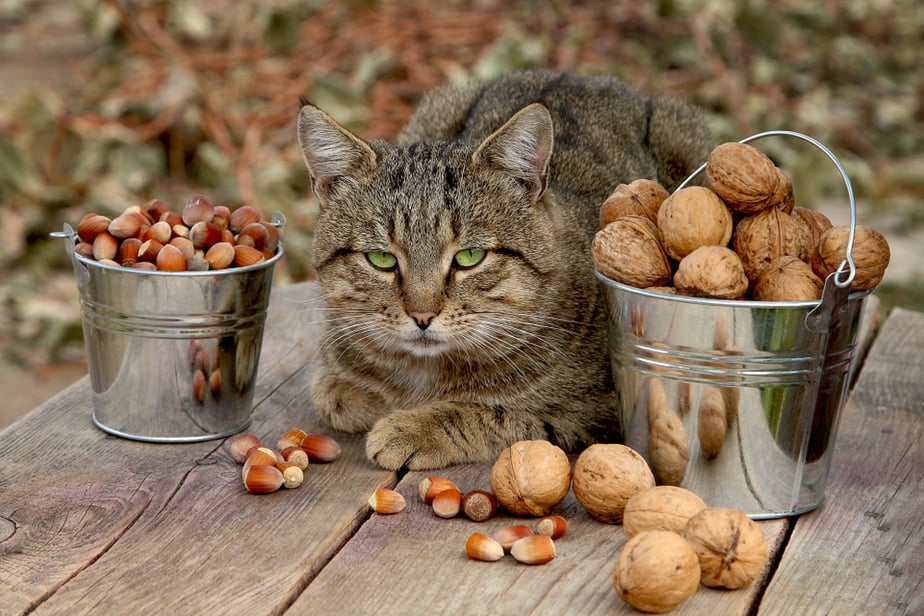
Cats can eat pecans but they can’t eat pecan shells. Your furry friend should never eat pecans that you haven’t previously cleaned and deshelled. Additionally, make sure to never leave any shells on the floor or anywhere else your cat might be able to reach.
Pecans are quite hard and crunchy on their own. Just imagine what a choking hazard pecan shells would be!
Not only that, pecan shells will cause serious digestive issues to your cat. She’ll experience an upset stomach, intestinal obstruction, vomiting, and diarrhea.
If your cat accidentally ingests pecan shells make sure to contact your vet immediately. Follow his advice and make sure you’ve removed any remaining shells from her mouth. If she’s experiencing extreme reactions and symptoms, you can take her to the nearest emergency animal care.
Can cats eat pecan pie?
Luckily for us, cats aren’t drawn to sweets. They are incredibly curious creatures, and you shouldn’t be too surprised if you find your cat hidden under the table munching on a huge chunk of pecan pie your little niece dropped a couple of moments ago.
There’s no need to panic, cats can eat pecans. Pecan pie might not be the healthiest choice of dinner for your cat, but it shouldn’t cause her much distress.
If you do notice that your cat is acting a little weird after eating that chunk of the pie, make sure to contact your vet.
Pecans are alright for your cat, but what about the other ingredients? Pecan pie is normally made with tons of sugar, butter, and eggs.
Sugar isn’t toxic to cats, but it’s also not the best choice for their little tummies. Cats have a hard time breaking down sugar which leads to various digestive issues.
Butter isn’t any better! It definitely isn’t toxic to cats, but it contains high levels of saturated fat which can affect your kitty’s health negatively in the long run. Too much butter can lead to digestive issues, feline obesity, and a shorter lifespan.
Eggs are pretty safe for your cat, as long as they’re cooked. Raw eggs can cause an array of health issues because they can carry e.coli and salmonella. If your cat’s eaten a chunk of pecan pie you don’t have to worry about bacteria. Cooked eggs are safe.
To sum up, cats shouldn’t eat pecan pie as a regular part of their diet but you shouldn’t be worried if she eats a piece during Thanksgiving dinner.
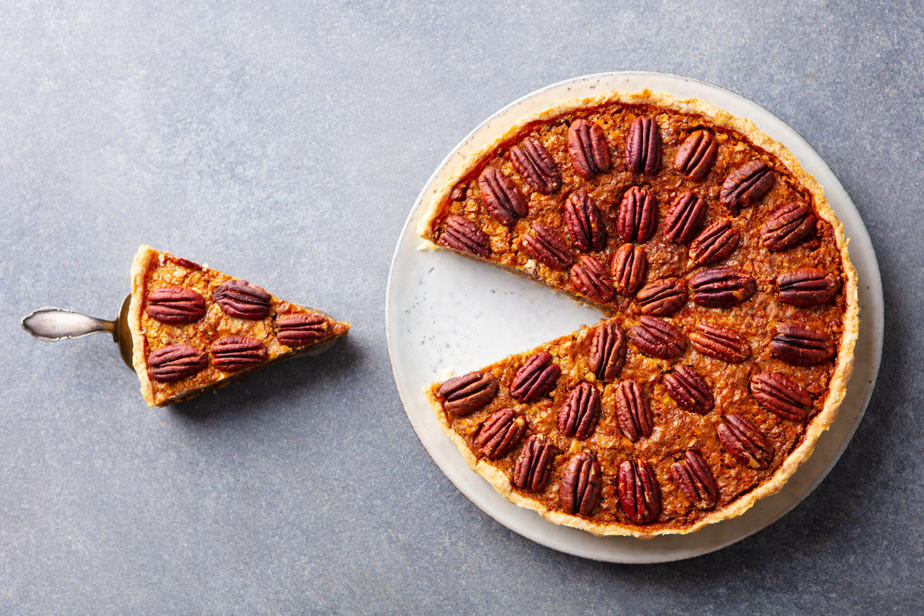
The final verdict
Cats can eat pecans. Next time you decide to make a mouth-watering pecan pie, save some chopped-up pecans for your feline friend. A small amount every now and then can provide your cat with Omega-3 fatty acids, vitamins, and minerals.
But you need to be careful – too many pecans can cause some adverse reactions. They can give rise to various digestive issues, feline obesity, and other weight-related diseases.
Pecans can also be a choking hazard so make sure to watch your feline friend closely if she’s munching on these savory snacks.
Don’t forget to remove any shells as they can get stuck in your cat’s esophagus, and even cause an upset stomach, vomiting, and diarrhea. Also, don’t deshell your pecans next to your cat, you never know if some runaway pieces might end up under her paws.
Lastly, always make sure to consult with your vet before introducing any new foods to your feline friend’s diet. Cats are sensitive and prone to allergies, and it’s best to stay on the safe side when it comes to their food choices.
If you’re unsure about pecans, there are numerous appetizing alternatives on the market!
Read more: Can Cats Eat Chia Seeds? Superfood Or Super Risky?
